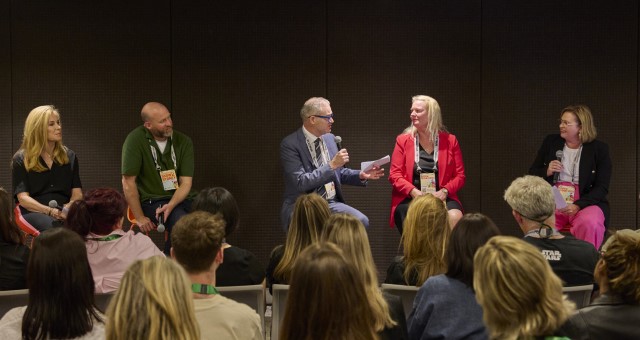Regenerative travel, biophilia, sensory design and demountable accommodation were among a host of emerging trends under discussion at The Future of Travel panel, hosted by Accor Pacific at SXSW Sydney.
Moderated by Accor Pacific CEO Sarah Derry, the panel of experts from the worlds of design, media and sustainability explored the possibilities and advancements that will shape the hotel and travel industry over the coming decades to 2050.
Nick Kavanagh Chief Strategy Officer at I Prospect discussed how innovative technologies such as artificial intelligence and augmented reality will impact the industry.
“What we’re seeing and what we believe is going to happen in the next few years is that technology will be used to augment your travel experience,” he said.
“It will become even more visceral through the use of digital and technological tools. That’s probably going to be done through a combination of mixed reality – the idea of applying a digital landscape over the physical one that you’re in – and haptic technology – which is used in gaming, it recreates the sense of touch and emotion movement on your body.
“This combination of mixed reality and haptic technology is really going to change how we move through the places that we visit.”
Juliette Ashworth Partner and Creative Director of design firm Chada spoke about pointed to connection to nature as a huge trend that will continue to grow, particularly through biophilia – “bringing nature into design”.
“That doesn’t mean adding a few pot plants, it’s going to the next level of sophistication,” Ashworth said.
“There’s a new brand by a man called Barry Stern, who is a visionary in the hotel world, called Hotel One, and it’s coming to Australia. It’s all about ‘if it isn’t in nature, it isn’t in his hotel’. Everything in it is natural materials, organic or living and he has dedicated staff to look after the plant life in the hotel.”
Ashworth also predicted a rise in pop-ups and demountable accommodation as well as mega integrated developments that follow a particular theme.
“I saw a prototype of a hotel the other day that is a form of accommodation that is also a non-carbon emitting vehicle,” she said.
“You don’t have to leave the comfort of your hotel or get on a plane; you can go from island to island or from beachside to lakeside to mountain top.
“It’s very futuristic, but air travel isn’t really sustainable long term, so I think there’s going to be a lot of innovation around pop-ups of experiences and demountables and being able to go and see and do things out of season in a more innovative and sustainable way.”
Travel media commentator Quentin Long and Ecotourism Australia CEO Elissa Keenan discussed the evolution of regenerative travel and the importance of protecting natural treasures from over tourism.
“There’s a great quote – ‘the greatest threat to our planet is that is the thought that somebody else going to do something about it’. And really for us, the time has passed for us to really start thinking about sustainability,” said Keenan.
“For us, sustainability means four pillars. It’s really good sustainable business management, because you can’t be green if you’re in the red. It is about absolute positive cultural impact. It’s about positive socio-economic impact and supporting local communities. And certainly, it’s about positive environmental impact.”

